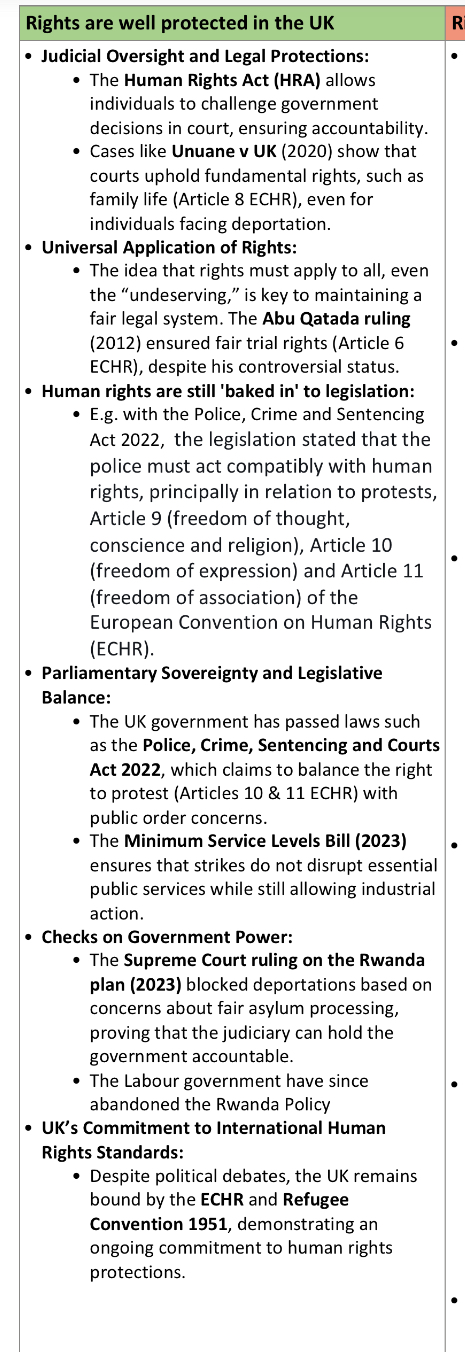Rights protection in the UK
1/4
There's no tags or description
Looks like no tags are added yet.
Name | Mastery | Learn | Test | Matching | Spaced |
|---|
No study sessions yet.
5 Terms
Sources of Rights in the UK
Magna Carta
ECHR - . It was designed to prevent a repeat of the violations of human rights in Nazi Germany. The European Court of Human Rights was set up in Strasbourg to hear cases where people felt their rights had been violated. It costs an average of £30,000 and takes an average of five years to have a case heard at the court. Its decisions are binding on all signatories including the UK. However, the ECHR has found that British prisoners should have the right to vote four times beginning in 2005 and the British government has refused to implement those rulings.
The ECHR gives people the right to life, freedom from torture, freedom from slavery, right to liberty and security, right to a fair trial, right not to be punished except through law, respect for family life, home and correspondence, freedom of thought and religion, freedom of expression, freedom of assembly, right to marry and protection from discrimination.
Human Rights Act - FunctionsS
The 1998 Human Rights Act was drawn up by the Blair government to incorporate the ECHR into British law. It does three things.
Firstly, it instructs courts to interpret primary and secondary legislation in such a way as not to conflict with the ECHR, either by adding words or taking words out of the relevant law. The courts will only do this if it doesn’t violate the intent of the relevant law.
Secondly, it can issue a declaration of incompatibility if a law contradicts the ECHR and cannot be reinterpreted to make it compatible. This is a request for Parliament to look at the law again. The courts cannot overturn a law because that would contradict the principle of parliamentary sovereignty. Parliament almost always legislates to resolve the incompatibility.
For example:
The declaration of incompatibility for the 1973 Matrimonial Causes Act, which made no provision for transgender people, was resolved by an amendment to the 2004 Gender Recognition Act.
The only occasion on which a declaration of incompatibility has not been resolved by Parliament is the 2014 Smith vs Scott case, which found that it was incompatible with the ECHR to deny British prisoners the right to vote.
Thirdly, it states that all public bodies need to act in a way which is compatible with the ECHR. This means that courts are making greater use of judicial review (a process according to which a court reviews the actions of public bodies).
Fourthly, since the courts are public bodies (and the Human Rights Act states that public bodies have to act in a way which is compatible with the ECHR) any legal judgement on any subject has to be compatible with the ECHR.
Consequentially:
The number of reviews rose from around 4,240 in 2000 to around 15,600 in 2013.
The High Court has ruled against the government on numerous occasions, for example:
2004: 'Belmarsh Case' - ruling that the government couldn't indefinitely imprison foreign nationals suspected of terrorism, without trial
2008: Ruling that retired Gurkha soldiers should be allowed to settle in the UK
2013: The government had not consulted fairly on compensation for people affected by the High Speed Rail link
2022: ECHR stopped the deportation of several people to Rwanda (June 2022) but following this Johnson hinted that the UK could leave the European Convention on Human Rights to make it easier to remove illegal migrants from the UK
2010 Equality Act
The 2010 Equality Act was introduced by the Brown government to protect people from discrimination, harassment, or victimisation in employment or as users of private or public services according to the protected characteristics of age, disability, gender reassignment, marriage, pregnancy/maternity, race, religion/belief, sex and sexual orientation.
In 2013, Bull v Hall case. Christian hoteliers in Cornwall sued by a gay couple because the hoteliers had refused them to stay in the hotel, citing their view that homosexuality was a sin and they didn't want to support it
In 2020, BBC journalist Samira Ahmad sued the BBC under this act for unequal pay.
Rights are well protected

Rights are not protected
